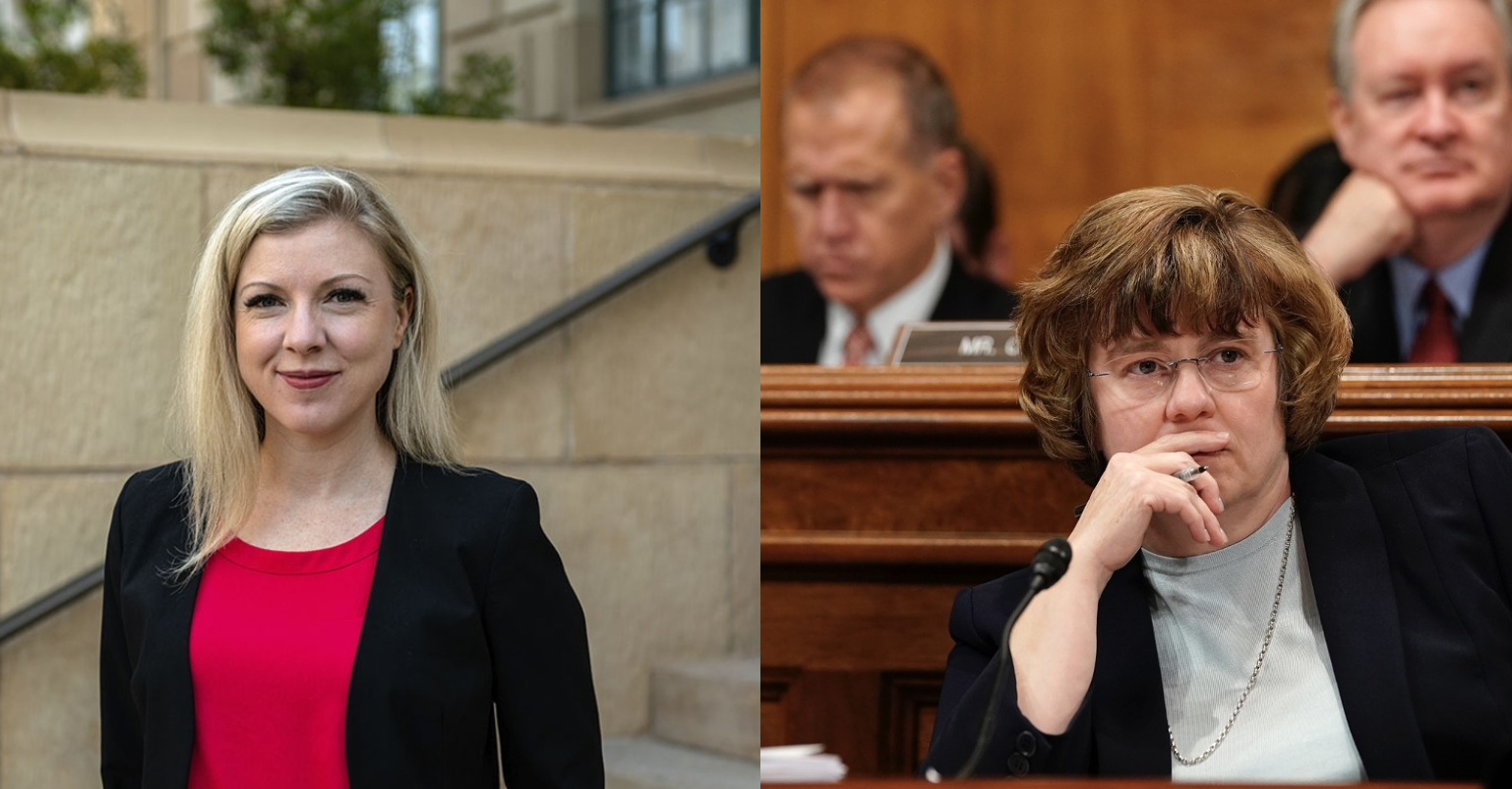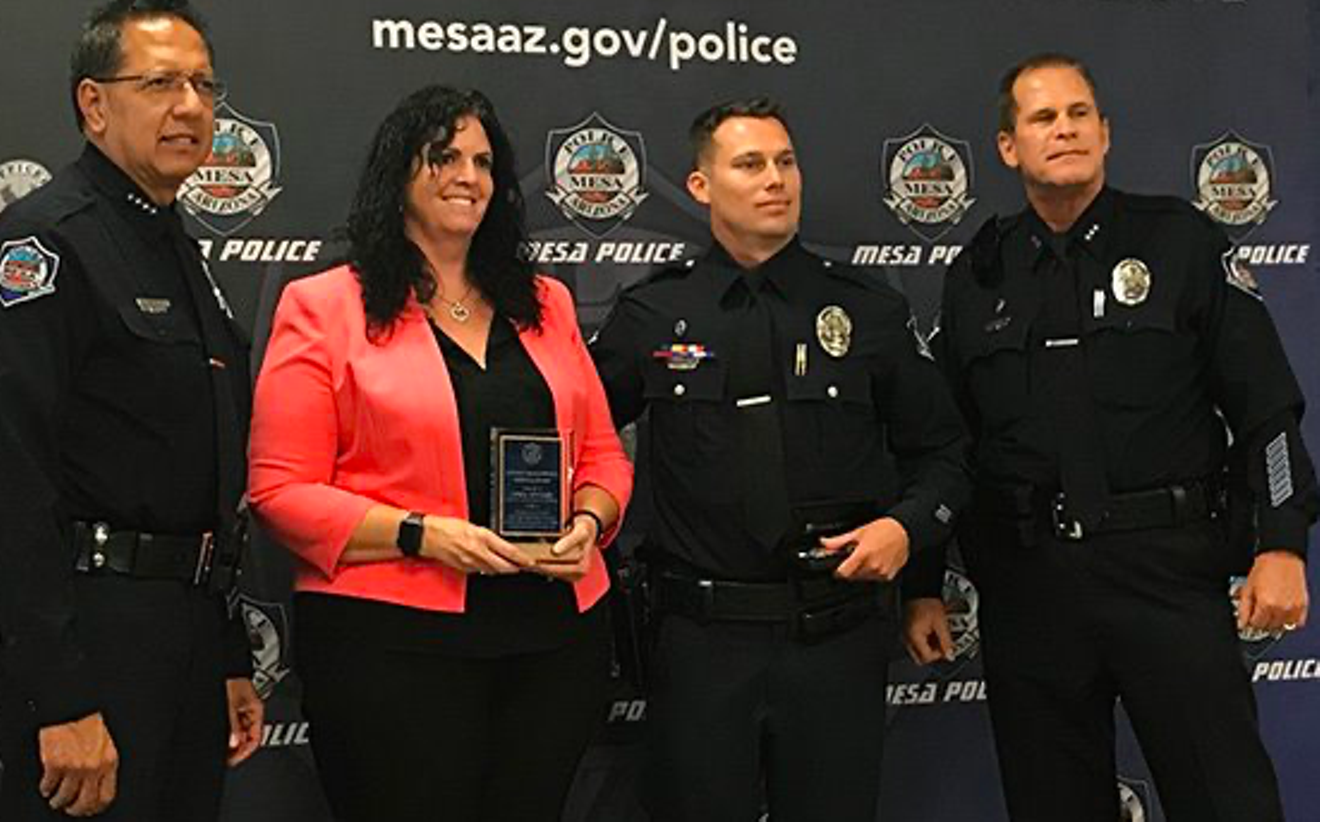
Erin Schaff/Getty and Ash Ponders

Audio By Carbonatix
The race for Maricopa County Attorney is one between two starkly different candidates: current County Attorney Rachel Mitchell, a longtime sex crimes prosecutor with a tough-on-crime outlook, and Julie Gunnigle, a firebrand attorney who has been a harsh critic of the county attorney’s office.
One point upon which Gunnigle and Mitchell disagree? Marijuana sentencing. The issue came up during a September 15 debate on PBS when Gunnigle referenced a case that was the subject of a Phoenix New Times story in August.
The moderator of the debate, longtime Arizona Horizon host Ted Simons, posed a question about Gunnigle’s self-proclaimed plans to “redefine” public safety.
In response, Gunnigle explained that she was focused on reducing “outrageously long” drug sentencing. “Just this last month, our county attorney defended a 16-year sentence for someone who was convicted of selling an ounce of marijuana,” she said.
Gunnigle was referring to the case of Trent Bouhdida, who in 2017 received a 16-year prison sentence for selling marijuana. Four times over the course of several months, Bouhdida sold a quarter ounce of pot to an undercover Tempe cop. In August, the Arizona Board of Executive Clemency declined to shorten Bouhdida’s sentence.
The case was prosecuted when former County Attorney Bill Montgomery – now an Arizona Supreme Court justice – was in office. Mitchell, who later became Montgomery’s second-in-command, was then bureau chief of the special victims division. In August, Mitchell declined to speak with New Times about Bouhdida’s case, and her campaign did not respond to inquiries for this story. At last week’s debate, though, Mitchell spoke out in favor of the sentence.
“Julie has repeatedly told that story and left out significant parts of it,” Mitchell said. “You know, you can’t play fast and loose with facts and be a prosecutor. That’s not right; it’s not a good look. That person had been convicted of armed robberies. He had committed six armed robberies in order to earn his way into a gang. Then, he was on probation, and then he sold, on multiple occasions, marijuana.”
Mitchell noted, correctly, that it is still illegal to sell marijuana in Arizona – unless you’ve managed to get your hands on a multimillion dollar dispensary license. But Mitchell’s description wasn’t quite aligned with the facts of the case, either.
There are several reasons why Bouhdida’s sentence was so long – and it’s a good case study of how seemingly minor crimes can result in serious prison time for some people. Bouhdida did have prior convictions. When he was 15, he pleaded guilty to armed robbery and gang activity. But evidence and testimony in the case indicated that Bouhdida was present at the robberies and sitting in the car while they were carried out by his older friends.
That case was prosecuted by famed Maricopa County gang prosecutor April Sponsel, who was a key figure in a 2020 scandal in which Black Lives Matter protesters were charged as a criminal street gang. One of Mitchell’s first major actions as county attorney was to fire Sponsel. In the termination letter, a deputy chief wrote that Sponsel had a “disturbing pattern of overcharging.”
Mitchell has since repeatedly touted her decision to give Sponsel the boot as an example of her willingness to clean up the county attorney’s office.

April Sponsel was fired as a gang prosecutor with the Maricopa County Attorney’s Office earlier this year.
Mesa Police
‘Desperate Need of Reform?’
Mitchell is correct that the 16-year sentence was, in part, due to Bouhdida being on probation at the time of the marijuana sales. That increased the sentence by five years, even though he had an otherwise perfect probation record, was pursuing a college degree, and worked two jobs.
But there is no clear evidence in court records in the case to support the claim that Bouhdida was involved in the robberies to “earn his way into a gang.” The number of robberies also is disputed. Bouhdida admitted to witnessing four and ultimately pleaded guilty to two counts, not six. He was never identified in a lineup.
“If someone has a past history and priors as described, does it not make sense to go a little tougher on them?” Simons then asked Gunnigle.
“I mean, potentially, if they’re going to receive treatment so that they don’t re-offend,” Gunnigle responded. She added that too often, people leave prison without having been prepared to rejoin society. “And I think when we go after folks, especially when we claim they’re dangerous to the community, we should be holding them accountable for what’s actually alleged,” Gunnigle explained.
Mitchell didn’t quite nail the facts surrounding the 16-year pot sentence, but Gunnigle also failed to get her facts right at other points. During the debate, she said she “never” tweeted about reducing the Phoenix Police Department budget by $25 million. But in 2020, she tweeted basically exactly that and suggested reallocating $25 million in funds from policing to mental health services.
The September 15 debate was revealing in other ways, too. Gunnigle again doubled down on her commitment not to prosecute abortion providers or people who seek abortions, while Mitchell said she could not make such a promise. On September 27, Mitchell announced a change in course and said she would not prosecute women for having abortions, thought she did not address providers.
“I will not prosecute women for having abortions and no staff should even suggest that a woman will ever be prosecuted for her decision,” Mitchell said in a statement posted to social media.
The two also disagreed about whether or not there was a pattern of overcharging in the county attorney’s office. Mitchell said the “vast majority” of cases were handled appropriately, while Gunnigle said the office was in desperate need of reform to address the issue.
Mitchell said Gunnigle’s reforms are “exactly the same” as progressive prosecutors in other cities, such as San Francisco, who have faced recall efforts by voters. “It’s not just people who believe we need reform on the left. It’s also people on the right who think we’re in desperate need of reform,” Gunnigle responded. Crime, she added, is prevented when prosecutors focus more on the “root causes.”
The choice between the two will soon go to voters. Mitchell has served as interim county attorney since she was appointed to the role in April, after the resignation of former county attorney Allister Adel. In November, voters will choose the next official top prosecutor from between the two candidates.